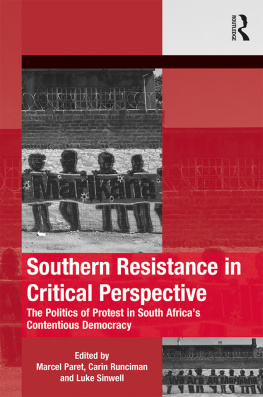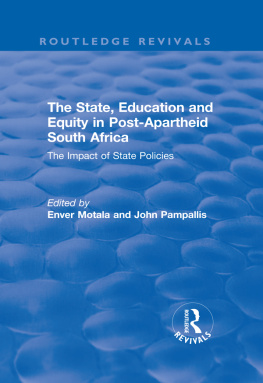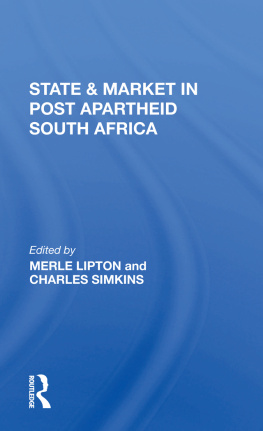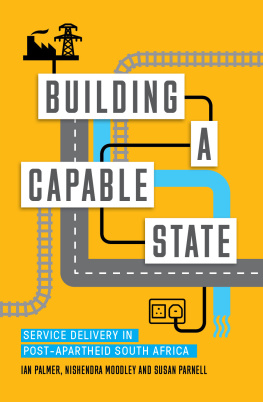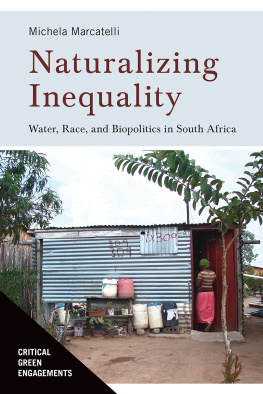P RINCETON S TUDIES IN C ULTURE AND T ECHNOLOGY
Tom Boellstorff and Bill Maurer, series editors
____________________
This series presents innovative work that extends classic ethnographic methods and questions into areas of pressing interest in technology and economics. It explores the varied ways new technologies combine with older technologies and cultural understandings to shape novel forms of subjectivity, embodiment, knowledge, place, and community. By doing so, the series demonstrates the relevance of anthropological inquiry to emerging forms of digital culture in the broadest sense.
____________________
Sounding the Limits of Life: Essays in the Anthropology of Biology and Beyond
by Stefan Helmreich with contributions
from Sophia Roosth and Michele Friedner
Digital Keywords: A Vocabulary of Information Society and Culture
edited by Benjamin Peters
Democracys Infrastructure: Techno-Politics and Protest after Apartheid
by Antina von Schnitzler
Everyday Sectarianism in Urban Lebanon: Infrastructures, Public Services, and Power
by Joanne Randa Nucho
Copyright 2016 by Princeton University Press
Published by Princeton University Press, 41 William Street, Princeton, New Jersey 08540
In the United Kingdom: Princeton University Press, 6 Oxford Street, Woodstock, Oxfordshire OX20 1TR
press.princeton.edu
Cover art: Cartography I (2009) by Clive van den Berg (reproduced courtesy of the artist)
All Rights Reserved
Library of Congress Cataloging-in-Publication Data
Names: von Schnitzler, Antina, 1975 author.
Title: Democracys infrastructure : techno-politics and protest after apartheid / Antina von Schnitzler.
Description: Princeton : Princeton University Press, 2016. | Includes bibliographical references and index.
Identifiers: LCCN 2015045836| ISBN 9780691170770 (hardcover : alk. paper) | ISBN 9780691170787 (pbk. : alk. paper)
Subjects: LCSH: Political participationTechnological innovationsSouth Africa. | TechnologyPolitical aspectsSouth Africa. | CitizenshipSouth Africa. | Communication in politicsTechnological innovationsSouth Africa. | Mass mediaPolitical aspectsSouth Africa. | South AfricaPolitics and government1994
Classification: LCC JQ1981 .S365 2016 | DDC 323/.0420968dc23 LC record available at http://lccn.loc.gov/2015045836
British Library Cataloging-in-Publication Data is available
This book has been composed in Janson Test LT Std
Printed on acid-free paper.
Printed in the United States of America
10 9 8 7 6 5 4 3 2 1
Acknowledgments
In the writing of this book I have incurred innumerable debts. First and foremost, I would like to thank the members of the Phiri Concerned Residents Forum and the many residents of Phiri who opened their homes and made time for conversations. I am also grateful to the members of what was at the time the Anti-Privatisation Forums Research Subcommittee whose company both sharpened my questions and forced me to think about their relevance beyond the academy.
This book began its life as a doctoral thesis in anthropology at Columbia University. I would like to thank the members of my committee, Partha Chatterjee, James Ferguson, Mahmood Mamdani, Timothy Mitchell, and David Scott, for their support and their insights. Each of them in their own way taught me how to think differently about writing, scholarship, and politics. I was lucky to be surrounded by a wonderful group of fellow students at Columbia, many of whom gave feedback on my writing. Im especially grateful to Mireille Abelin, Siva Arumugam, Yogesh Chandrani, Ryan Chaney, Ruchi Chaturvedi, Nadia Guessous, Anush Kapadia, Yukiko Koga, Nadia Loan, Sofian Merabet, Juan Obarrio, Poornima Paidipaty, Suren Pillay, Manuel Schwab, Ravi Sriramachandran, and Arafaat Valiani. Long before I began graduate study, Richard Wilsons seminars on political and legal anthropology at the University of Sussex set me on this road, and Im thankful to be able to draw on his advice still.
At The New School, I am fortunate to have a supportive and intellectually engaging group of colleagues in the Graduate Program of International Affairs, in the Department of Anthropology, and across several other departments. Rachel Heiman, Erica Kohl-Arenas, Manjari Mahajan, Gustav Peebles, and Janet Roitman each gave excellent feedback on chapter drafts. I am also grateful to Jonathan Bach, Michael Cohen, Sakiko Fukuda-Parr, Sean Jacobs, Nina Khrushcheva, Hugh Raffles, Sanjay Ruparelia, Everita Silina, Nidhi Srinivas, Ann Stoler, and Miriam Ticktin for conversations and advice along the way, and to the staff at GPIA for their support, in particular Christina McElderry and Philip Akre. I am especially grateful to Stephen Collier who has been an incisive interlocutor from the time I first began thinking about this project, and who read and commented on many chapters of the final product.
Over the years, many friends and colleagues beyond The New School have read chapters or shorter pieces that became part of the book and gave insightful feedback. Amongst them I owe particular thanks to Ujju Aggarwal, Nikhil Anand, Andrew Barry, Geoff Bowker, Dominic Boyer, Bernard Dubbeld, Cassie Fennell, Paul Kockelman, and Peter Redfield. I benefited from discussions with many other friends and colleagues over the years, including Hannah Appel, Andrea Ballestero, Franco Barchiesi, Patrick Bond, Brenda Chalfin, Sharad Chari, Akhil Gupta, Gabrielle Hecht, Kregg Hetherington, Ulrike Kistner, Premesh Lalu, Trevor Pinch, Richard Rottenburg, Melanie Samson, Suman Seth, and Paige West. Brian Larkin has been an inspiring interlocutor on things infrastructural, and I have been grateful for his generous advice throughout.
The semester I spent as a Visiting Fellow at the Kellogg Institute for International Studies at the University of Notre Dame provided me with much needed time and a supportive environment in which to focus on writing. Thanks to Paolo Carozza and the faculty and staff at the Kellogg for making this possible and especially to Paul Ocobock and Catherine Bolten, who provided helpful feedback on one of the chapters. A few months at the Wits Institute for Social and Economic Research (WiSER) at the University of Witwatersrand provided a generative intellectual community as I was revising the manuscript. I would like to thank the faculty and staff at WiSER, and especially Sarah Nuttall, Catherine Burns, and Achille Mbembe, for their comments on a paper that became part of the book. I owe particular thanks to Keith Breckenridge, who generously read and commented on several chapters of the manuscript.
I would also like to thank the many engineers, consultants, City of Johannesburg officials, and staff at Johannesburg Water and Eskom who made time for interviews and conversations, and who let me enter into to the world of infrastructure technology, utility management and municipal politics. I am also grateful to the staff at the Centre for Applied Legal Studies at Wits and to many social movement activists who generously gave advice and provided documentation, in particular Jackie Dugard and Dale McKinley. Archivists at the Department of Historical Papers at the University of the Witwatersrand and at the South African History Archives were immensely helpful in their guidance.



